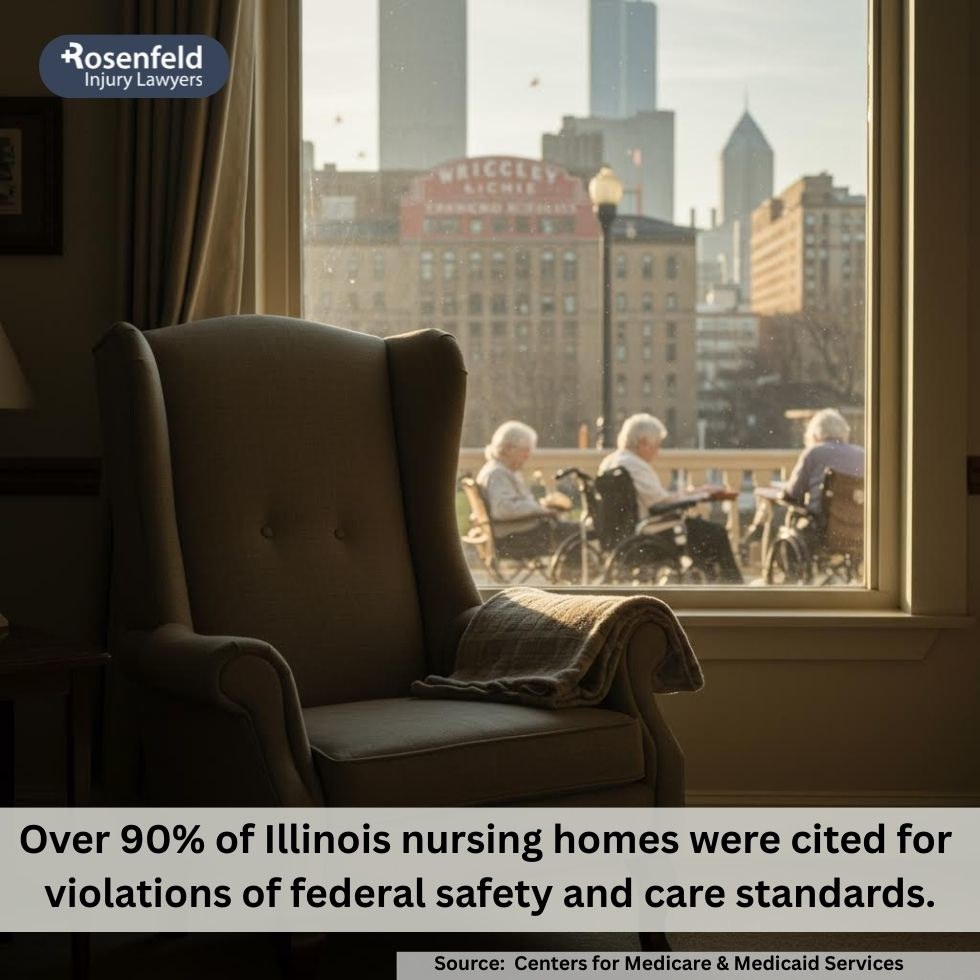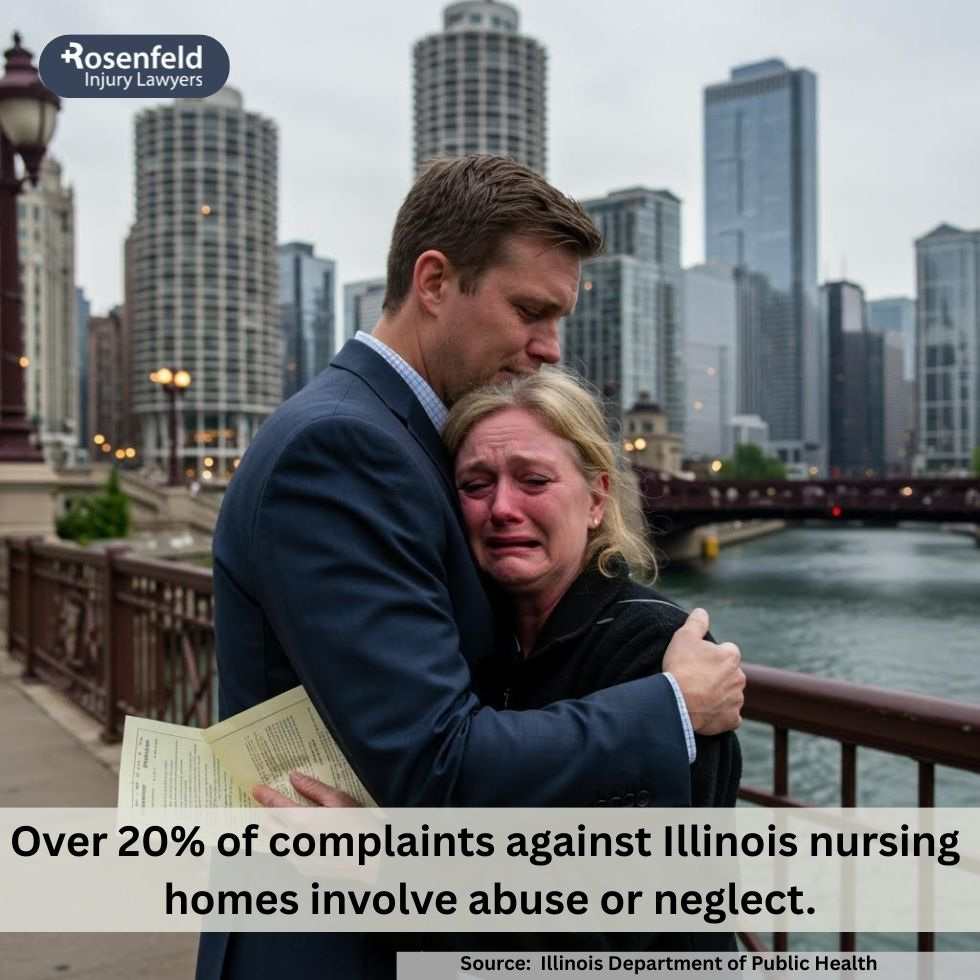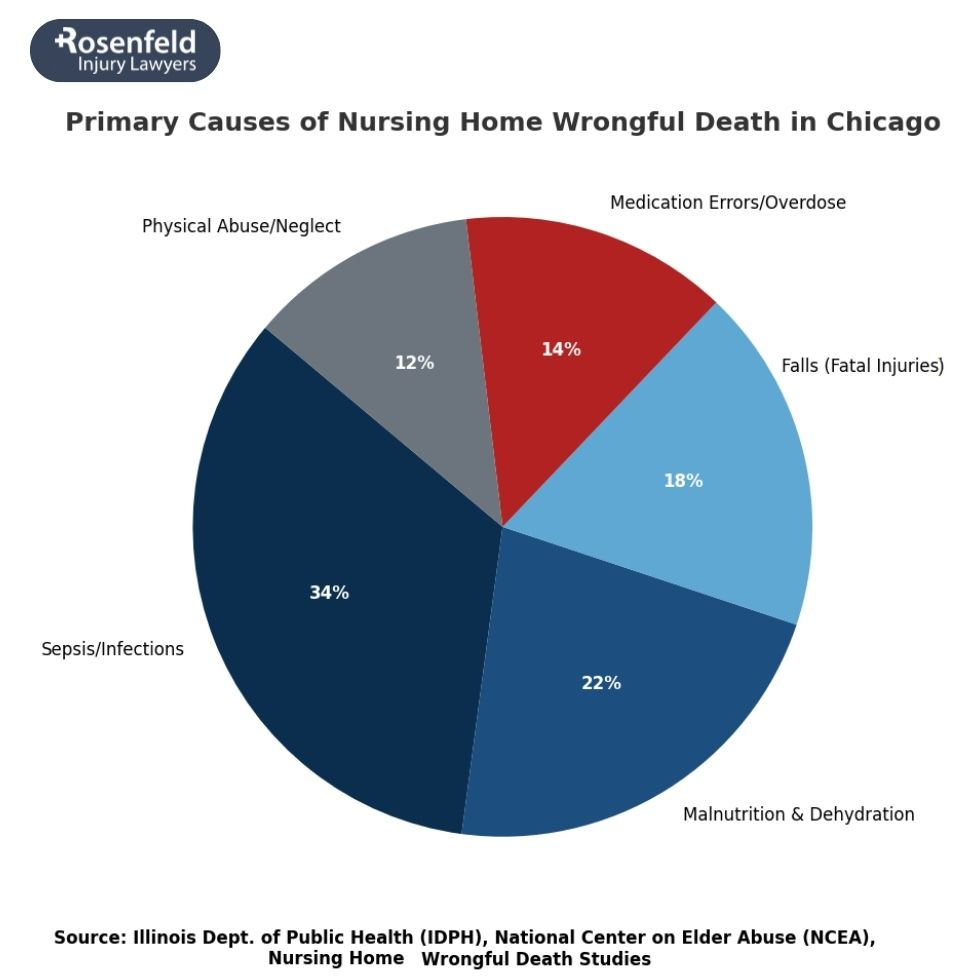- 24/7 Free Consultation: (888) 424-5757 Tap Here To Call Us
Chicago Nursing Home Wrongful Death Attorney

Recovering Compensation for Families Who Lost Loved Ones to Nursing Home Negligence
A Chicago nursing home wrongful death attorney understands that the death of a loved one in a long-term care facility should never be ignored, especially when there are signs of neglect or mistreatment. When a vulnerable resident dies under suspicious or unexplained circumstances, families deserve both answers and fair compensation.
At Rosenfeld Injury Lawyers, our Chicago nursing home negligence lawyers represent families throughout Cook County in nursing home death claims against negligent facilities. Our team provides clear guidance, compassionate support, and experienced legal advocacy to help you pursue justice and hold those responsible accountable.
Some example settlements we have recovered include:
- $3,000,000 for a woman whose husband died from pressure sore complications after hip surgery.
- $2,150,000 for a resident who developed bed sores and sepsis in a nursing facility.
- $1,700,000 after a nursing home fall, causing a fatal subdural hematoma and hip fracture.
- $1,500,000 for the family of a dementia patient who died after ingesting chemicals from an unsecured storage closet.
- $1,250,000 for a resident who choked during an unsupervised meal.
Illinois Law on Fatalities Caused by Nursing Facility Negligence
Under the Illinois Wrongful Death Act (740 ILCS 180), fatal negligence occurs when someone dies due to another party’s negligence or misconduct, including a nursing home or assisted living facility. If the resident had a valid personal injury claim, had they survived, their estate may have pursued a lawsuit on behalf of surviving family members.
Wrongful death victims in nursing homes often suffer from poor medical care, lack of supervision, or systemic safety failures. These lawsuits allow families to seek justice for the emotional and financial impact of the resident’s severe injuries and the circumstances of their death.

Other Illinois Laws Protecting Nursing Home Residents
Federal regulations and Illinois law outline specific rights for nursing home residents, including the right to their own doctor. When these rights are violated, families may file a civil lawsuit to hold the facility accountable.
Illinois Nursing Home Care Act
The Illinois Nursing Home Care Act (NHCA) sets care standards for nursing homes, protecting residents from abuse and neglect. It allows nursing home residents and families to take legal action if a violation results in serious harm or death.
Illinois Survival Act Claims
The Survival Act lets a resident’s estate pursue compensation for pain, suffering, and medical expenses before death. These damages are awarded to the estate and distributed under Illinois inheritance laws.

How Negligence Leads to Fatalities in Nursing Homes
Elderly residents rely heavily on staff for daily care and safety. When a nursing facility fails to provide proper supervision or medical support, the results can be fatal. Abuse or neglect that causes serious harm may give families grounds for a claim following the death.
Fatal Falls Due to Inadequate Supervision or Hazards
Falls are a leading cause of wrongful death in Chicago nursing homes. Poor lighting, cluttered hallways, and ignored fall risk assessments often lead to fatal head trauma or hip fractures. These oversights are often signs of negligence and may lead to a medical malpractice claim.
Untreated Infections Leading to Sepsis and Death
Infections like Urinary Tract Infections (UTIs) or pneumonia can progress to sepsis if not treated quickly. When nursing home staff miss symptoms or delay medical care, the consequences can be deadly. These failures often reflect a pattern of systemic neglect.
Severe Malnutrition or Dehydration Complications
When residents don’t receive proper nutrition or hydration, their health rapidly declines. Weight loss, weakness, and organ failure are often linked to inadequate oversight or staff shortages. These are all conditions that may justify a claim for a preventable death.
Fatal Medication Errors
Giving the wrong medication or skipping doses can lead to fatal complications. Medication mistakes in a nursing home may involve underqualified staff or poor oversight and are often considered medical malpractice. These errors are preventable and may be the basis of legal action.
Death and Decline from Nursing Home Abuse Leading
Abuse or neglect in a nursing home can cause rapid health decline or even death. When nursing home staff members inflict harm or fail to protect residents, the consequences are often severe and legally actionable.
Physical Abuse
Physical abuse, including hitting or the use of physical or chemical restraints, can cause infections, internal injuries, or worsening medical conditions. If a nursing home resident dies as a result, the facility may be liable.
Emotional and Mental Abuse
Emotional or mental abuse can lead to depression, refusal to eat, or withdrawal. These effects can weaken the body and increase the risk of death, especially when abuse or neglect is ongoing.
Sexual Abuse
Sexual abuse in a nursing facility may cause trauma, infection, or death in vulnerable residents. When this abuse occurs, families may have grounds for a lawsuit.
Warning Signs Before a Tragedy Occurs
In many cases of nursing home abuse or neglect, there are visible signs that something is wrong early on.
Common red flags of abuse in a nursing facility include:
- Sudden and severe weight loss;
- Ongoing infections or untreated bedsores;
- Multiple ER visits or unexplained hospitalizations;
- Visible signs of pain, groaning, or mood changes;
- Bruises, fractures, or repeated falls without explanation;
- Signs of dehydration like dry skin or cracked lips.
These signs may signal nursing home mistreatment or neglect. Reporting concerns early can protect other nursing home residents and support a legal claim if the situation worsens.
Who Has the Right to Sue After a Resident’s Death in Illinois?
Only the Personal Representative of the deceased resident’s estate may file a wrongful death lawsuit in Illinois. This person may be:
- Named in the resident’s will
- Appointed by a probate court if no will exists
Although the Representative files the lawsuit, any financial recovery goes to the beneficiaries — usually the deceased’s surviving spouse, children, or parents.
Statute of Limitations: The Critical Deadline for Family Members
In Illinois, the statute of limitations for filing a wrongful death lawsuit is generally two years from the date of death. Missing this deadline—no matter how strong the evidence—can permanently bar your family’s right to seek compensation. Early legal guidance is critical to protect your ability to take action.
The Legal Burden of Proving Negligence Leading to Death
The law requires the plaintiff to show that it is more likely than not that the nursing home’s negligence contributed to the resident’s death. This includes showing:
- A duty of care existed (the facility agreed to provide care);
- The duty was breached (through an act of neglect, error, or abuse);
- The breach directly caused the death or significantly contributed to it.
This is where experienced attorneys, backed by medical experts and detailed investigations, make the difference.
Gathering Evidence
Chicago nursing home death claims are only as strong as the evidence behind them. A skilled attorney will gather the following:
- Complete medical records from the facility and hospitals;
- Care plans, daily logs, and medication administration records;
- Incident reports related to falls, injuries, or infections;
- Staff disciplinary history or turnover rates;
- Witness statements from family, other residents, or former staff;
- Expert opinions from doctors, nurses, and elder care specialists.
Establishing Causation
The legal case must show that the negligence directly led to the death. This link, known as causation, usually requires expert testimony and a close review of medical timelines.
For example, a resident develops bedsores. Staff fail to monitor or treat them. The sores become infected, leading to sepsis. The resident dies from septic shock. An attorney must show that the untreated pressure ulcer was the direct cause of death and that earlier care would have prevented it.
Compensation Available After a Loved One’s Death
Illinois law allows eligible survivors to recover a wide range of damages, including both economic and non-economic losses.
Economic damages may include:
- Funeral and burial costs
- Loss of income or financial support
- Loss of household services (e.g., transportation, caregiving, chores)
Non-economic damages may include:
- Emotional grief and anguish
- Loss of companionship, love, and society
- Loss of parental guidance or mentorship
These damages are awarded to compensate the family for the life-altering loss of their loved one.

Why You Need an Experienced Chicago Wrongful Death Lawyer
Preventable death claims involving nursing homes are legally complex, emotionally intense, and often vigorously defended by corporate counsel and insurers. You need an attorney who understands not just personal injury law but also elder care standards, long-term care regulations, and estate litigation.
At Rosenfeld Injury Lawyers, we:
- Know the Illinois Nursing Home Care Act inside and out.
- Work with respected medical and elder care experts.
- Handle every aspect of probate, filing, and litigation.
- Fight for full and fair compensation through settlement or trial.
Investigating the Death and Building Your Case
From the moment you contact us, we take action to:
- Preserve critical records before they’re lost or altered.
- Interview nursing home staff, witnesses, and family members.
- Review inspection reports and public health violations.
- Identify all liable parties (including corporate owners).
- Consult experts to verify care failures and causation.
We leave no question unanswered when your loved one’s life was cut short due to neglect.
Negotiating with the Nursing Home’s Insurance Company
Insurance companies often try to settle quickly and for a low amount, especially when grieving families feel overwhelmed. We handle all communication with the insurance carrier, present detailed damage reports, and advocate for maximum compensation that reflects your family’s loss.
Taking Your Case to Trial When Necessary
If a nursing home refuses to take responsibility or offers a settlement that doesn’t reflect the harm done, we are ready to file suit and take your case to trial in a Cook County court. We have a proven track record of securing results through litigation and the resources to see your case through to completion.
Our Law Firm’s Compassionate Approach for Grieving Families
We understand that this process is deeply personal. At Rosenfeld Injury Lawyers, we treat every family with the care and respect they deserve. While you focus on healing, we focus on fighting for justice.
Our Chicago wrongful death attorneys work on a contingency fee basis, so you pay nothing unless we win your case.
FAQs About Fatal Nursing Home Cases in Chicago
How Long Does a Nursing Home Fatality Case Usually Take?
It could take several months to two years, depending on the complexity of the case and whether it settles or goes to trial.
Can We Still Sue if Our Loved One Had Significant Pre-existing Health Problems?
Yes. Nursing homes must still provide adequate care regardless of pre-existing conditions. Negligence is measured by what should have been done under the circumstances.
How Is the Settlement or Court Award Distributed Among Family Members?
Distribution follows Illinois inheritance laws or any valid estate documents. The personal representative ensures proceeds are fairly divided among beneficiaries.
What Does It Cost to Hire a Wrongful Death Lawyer for These Cases?
We work on a contingency fee basis. This means there are no upfront costs, and we only get paid if we recover compensation for you.
Consult a Chicago Nursing Home Wrongful Death Lawyer Near You!

If you believe your loved one’s death was caused by a nursing home’s failure or someone else’s negligence in Chicago or Cook County, our experienced nursing home abuse lawyers are here to help. Contact us today for a free, confidential consultation at (888) 424-5757 or fill out our form to discuss your options..
All content undergoes thorough legal review by experienced attorneys, including Jonathan Rosenfeld. With 25 years of experience in personal injury law and over 100 years of combined legal expertise within our team, we ensure that every article is legally accurate, compliant, and reflects current legal standards.







